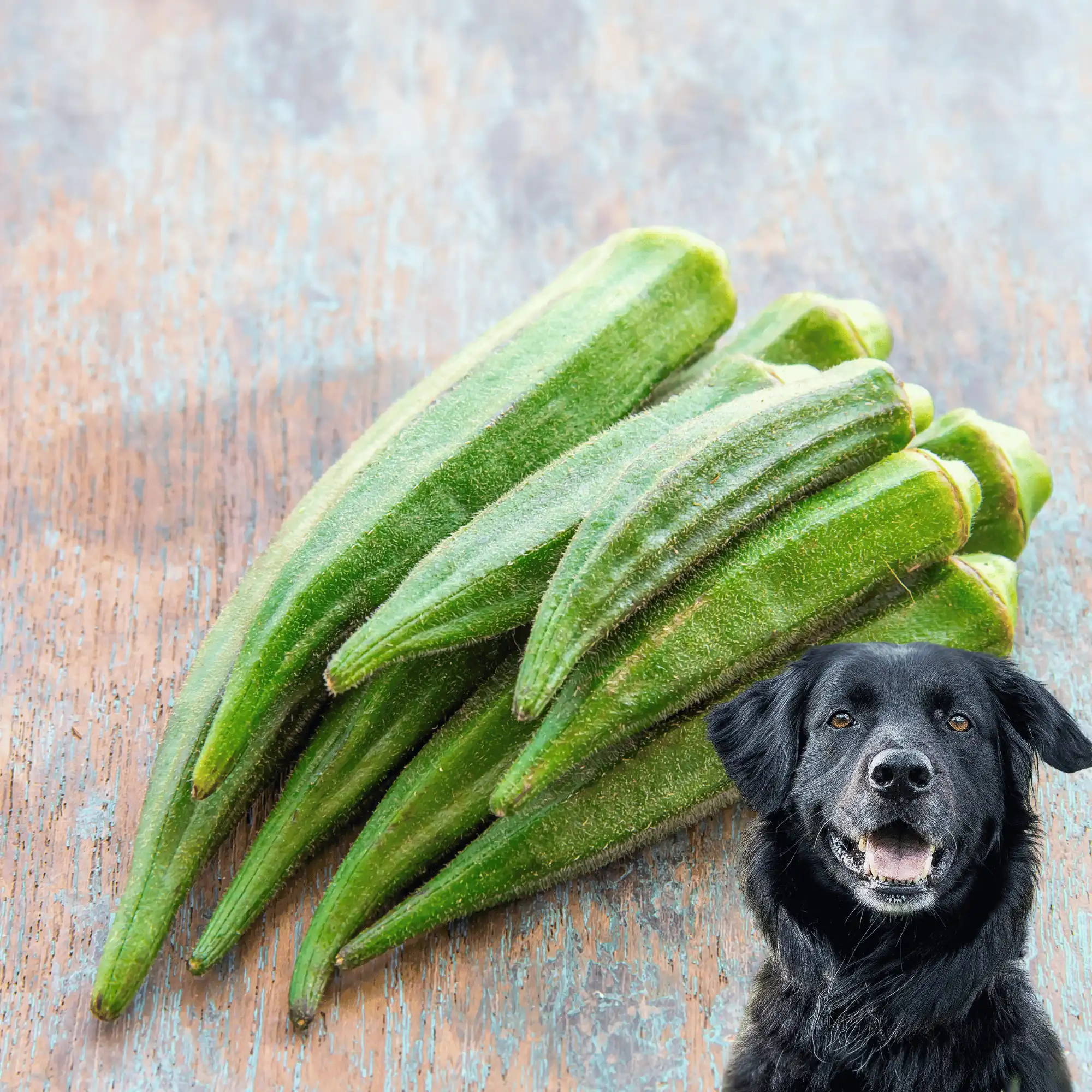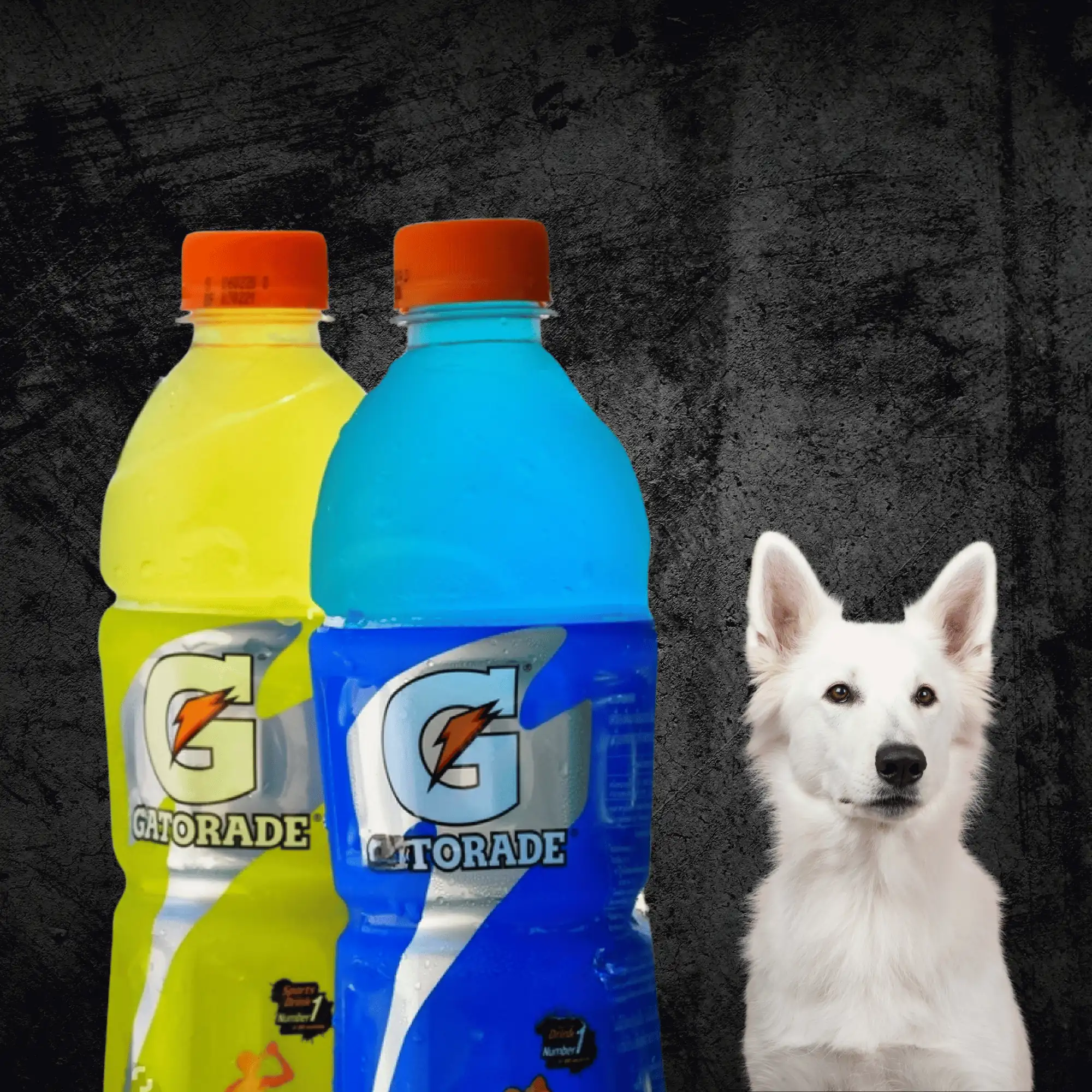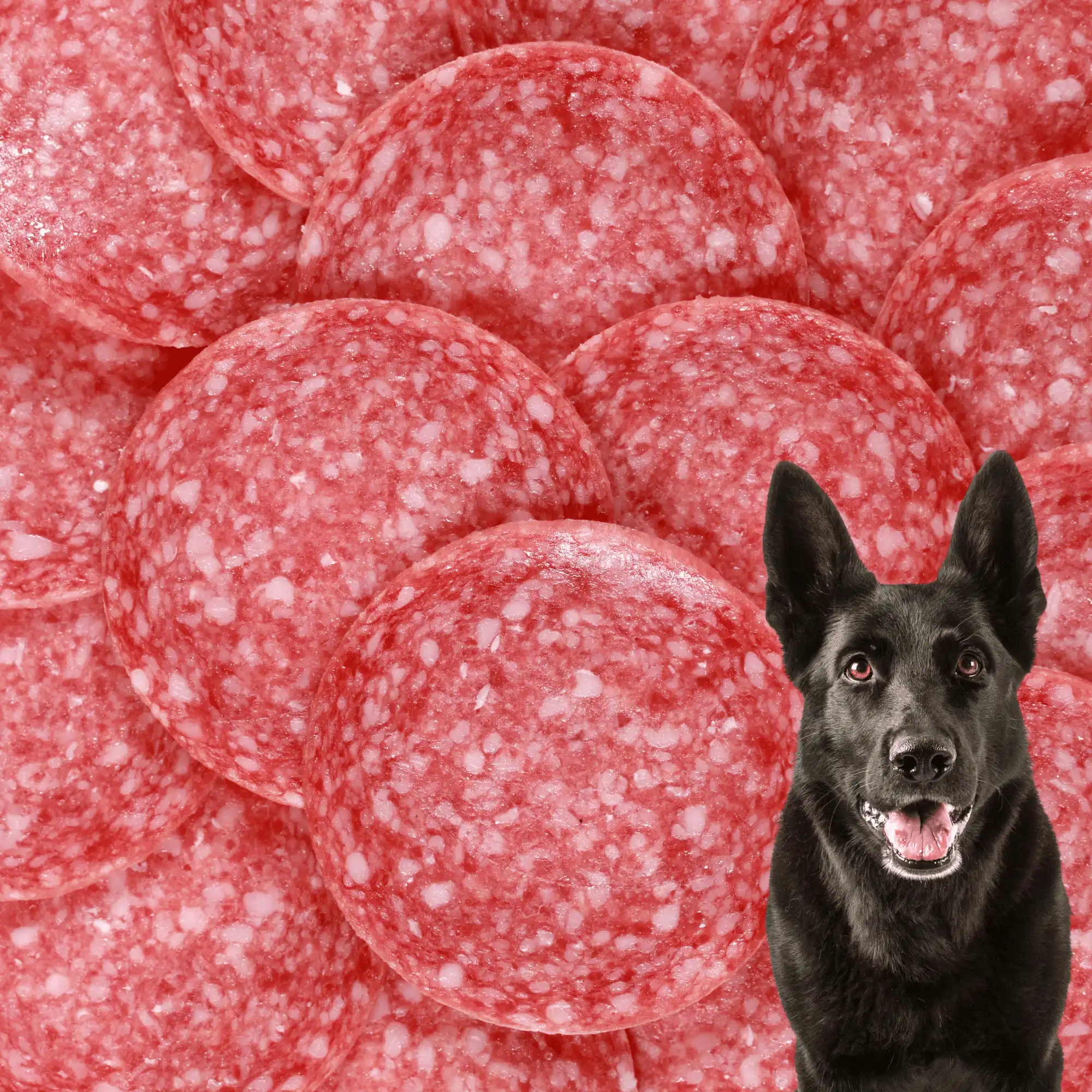Coconut milk, also known as thin coconut milk, has become popular in human diets due to its creamy texture, unique flavor, and potential health benefits. But can our furry companions enjoy this tropical treat safely? Let’s explore the question: Can dogs have coconut milk, and what are the benefits of it?
In this comprehensive exploration, we delve into the safety considerations and potential advantages of incorporating coconut milk into your dog’s diet, shedding light on this intriguing topic to ensure the well-being of our furry friends.
Below are the topics we’ll discuss in this blog post:
- Can Dogs Have Coconut Milk?
- Health Benefits of Coconut Milk for Dogs
- Risks of Feeding Coconut Milk to Dogs
- How to Safely Give Your Dog Coconut Milk
- Consult Your Veterinarian
Can Dogs Have Coconut Milk?

Yes, dogs can have small amounts of organic, unsweetened coconut milk. However, it’s essential to avoid products with additives like sugar, preservatives, or extra fats, as they can upset a dog’s sensitive stomach due to their high fat content. Additionally, refrain from allowing dogs to consume coconut shells, as they are challenging for their digestive systems to process.
Keep in mind that the majority of a dog’s calories—ninety percent—should come from dedicated dog food, with only ten percent from occasional human foods. It’s always wise to seek advice from a veterinarian before incorporating any human food into your dog’s diet.
Health Benefits of Coconut Milk for Dogs:
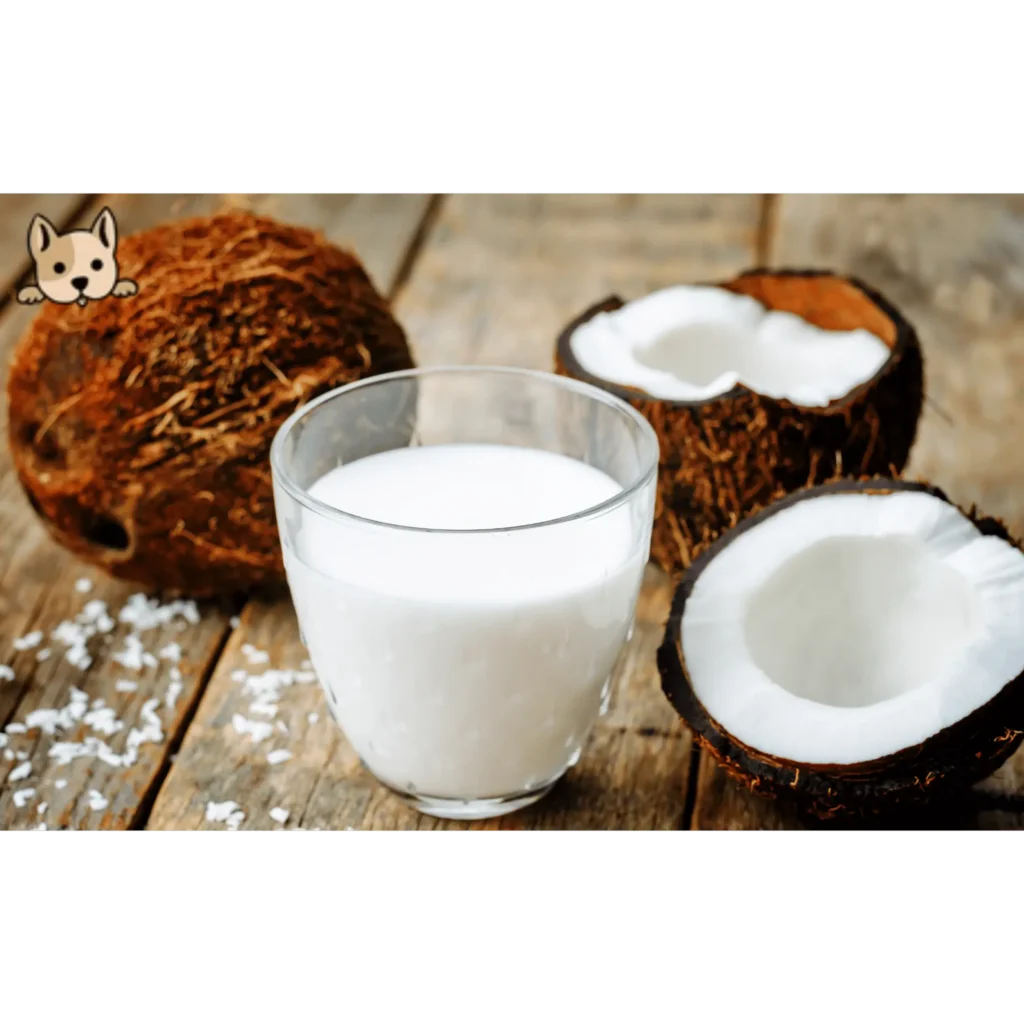
Coconut milk can offer several potential health benefits for dogs when incorporated into their diet in moderation. Some of these perks include:
1. Nutritional Value:
Coconut milk is rich in medium-chain triglycerides, specifically lauric acid. MCTs are easily digestible fats that can provide a quick source of energy for dogs. They are also believed to have antibacterial, antiviral, and antifungal properties, which may support overall immune health in dogs.
Coconut milk contains various vitamins and minerals that can contribute to a dog’s overall health. These may include potassium, magnesium, iron, phosphorus, and vitamins C and E.
Potassium is essential for proper muscle function and nerve signaling, while magnesium is important for bone health and energy metabolism. Vitamins C and E are antioxidants that help neutralize harmful free radicals in the body, potentially reducing the risk of chronic diseases.
2. Hydration:
Coconut milk is primarily composed of water, which can help keep dogs hydrated, especially during hot weather or after physical activity. Proper hydration is crucial for maintaining optimal bodily functions, including temperature regulation, digestion, and nutrient transport.
Adequate hydration is crucial for skin health; coconut milk can contribute to your dog’s overall hydration levels. Adding small amounts of coconut milk to your dog’s diet or using it as an occasional treat can help ensure they remain adequately hydrated, vital for maintaining supple, well-hydrated skin and a lustrous coat.
3. Digestive Health:
Coconut milk contains small amounts of dietary fiber, which can aid in digestion and promote regular bowel movements in dogs. Adequate fiber intake can help prevent constipation and regulate stool consistency.
Coconut milk is relatively easy for dogs to digest, making it a suitable option for those with sensitive stomachs or digestive issues. Unlike dairy milk, which may cause lactose intolerance in some dogs, coconut milk is lactose-free and less likely to cause digestive upset.
4. Anti-inflammatory Properties:
Coconut milk contains compounds like lauric acid, which have been suggested to possess anti-inflammatory properties. Inflammation in the mouth, often caused by gum disease or oral infections, can contribute to bad breath.
By potentially reducing inflammation, coconut milk may help improve overall oral health and breath freshness.
Despite these potential benefits, it’s essential to be cautious when giving coconut milk to your dog. Some dogs may be allergic to coconut or may experience digestive upsets such as diarrhea or vomiting. Additionally, coconut milk should be given in moderation due to its fat content, as excessive consumption can lead to weight gain and other health issues.
Risks of Feeding Coconut Milk to Dogs:
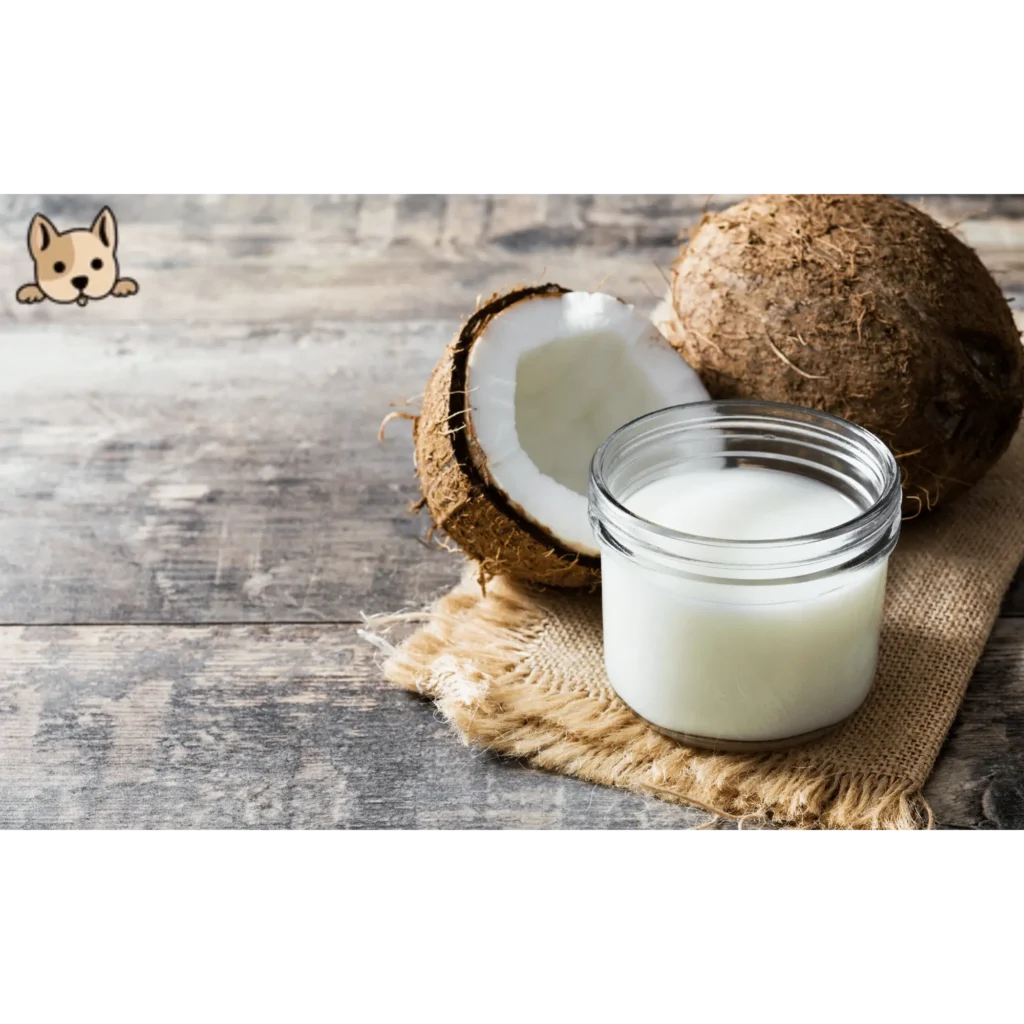
While coconut milk can offer some potential benefits for dogs when given in moderation, there are also drawbacks associated with feeding it to dogs. It’s essential to be aware of these risks to ensure the health and safety of your canine companion.
1. High Fat Content:
Coconut milk is relatively high in fat, particularly saturated fat. Excessive fat intake can contribute to weight gain and obesity in dogs, which can lead to various health issues such as joint problems, diabetes, and heart disease.
2. Gastrointestinal Upset:
Some dogs may have difficulty digesting coconut milk, leading to gastrointestinal upset such as diarrhea, vomiting, or abdominal discomfort. This is particularly true for dogs with sensitive stomachs or those prone to dietary intolerances or allergies.
3. Allergic Reactions:
While coconut allergies are relatively rare in dogs compared to other allergens, they can still occur. Allergic reactions to coconut milk may manifest as itching, skin rashes, hives, facial swelling, or gastrointestinal symptoms. If your dog shows any signs of an allergic reaction after consuming coconut milk, discontinue use and consult with your veterinarian.
4. Lactose Intolerance:
While coconut milk is lactose-free, some dogs may still experience digestive issues if they have lactose intolerance. Dogs with lactose intolerance lack the enzyme lactase, which is needed to digest lactose (the sugar found in dairy milk). While coconut milk doesn’t contain lactose, it’s still essential to monitor your dog for any signs of digestive upset.
5. Obesity Risk:
In addition to the high fat and calorie content of coconut milk, excessive consumption can contribute to obesity in dogs. Obesity is a significant risk factor for various health problems, including arthritis, diabetes, and cardiovascular disease.
It’s crucial to introduce coconut milk into your dog’s diet gradually and in moderation, while closely monitoring for any adverse reactions or changes in weight and overall health. Additionally, consult with your veterinarian before making any significant dietary changes or additions to your dog’s regimen, especially if your dog has pre-existing health conditions or dietary sensitivities. Your veterinarian can offer personalized recommendations tailored to your dog’s specific needs and circumstances.
How to Safely Give Your Dog Coconut Milk?
Feeding coconut milk to your dog can be done safely by following these steps:
1. Consult with a Veterinarian:
Before introducing coconut milk or any human food into your dog’s diet, speak with your veterinarian. They can provide personalized recommendations based on your dog’s breed, age, weight, and any existing health conditions. For example, if your dog is prone to weight gain or has a history of digestive issues, your vet may advise against feeding coconut milk due to its high fat content.
2. Choose Organic, Unsweetened Coconut Milk:
When selecting coconut milk for your dog, opt for organic varieties to limit exposure to pesticides and additives. Additionally, ensure that the coconut milk is unsweetened to avoid potential health issues associated with added sugar, such as weight gain and dental problems.
3. Serve Small Portions:
Start by offering your dog a small amount of coconut milk, no larger than a few ounces. Large quantities of coconut milk can upset your dog’s stomach and cause diarrhea or other digestive problems. You can also consider freezing small portions of coconut milk in an ice cube tray to create tasty frozen treats for your dog.
4. Avoid overfeeding your dog with coconut milk:
Avoid overfeeding your dog coconut milk due to its high-fat content, as excessive fat intake can lead to weight gain and pancreatitis. Watch for symptoms such as lethargy, vomiting, hunching, or diarrhea after consumption, which may indicate pancreatitis. If such symptoms occur, seek veterinary care promptly. Feed coconut milk in moderation, and consult your vet before introducing new foods to your dog’s diet.
5. Monitor for Side Effects:
After giving your dog coconut milk, closely monitor them for any signs of adverse reactions or side effects. These may include vomiting, diarrhea, abnormal behavior, stomach upset, or itchy skin, which could indicate an allergic reaction or intolerance. If your dog experiences any of these symptoms, discontinue the coconut milk and contact your veterinarian for guidance on the next steps.
By following these steps and monitoring your dog’s response, you can safely incorporate coconut milk into their diet as an occasional treat or supplement. However, it’s essential to remember that coconut milk should not replace a balanced and nutritionally complete diet formulated specifically for dogs. If you have any concerns or questions about feeding coconut milk to your dog, always consult with your veterinarian for personalized advice and recommendations.
Consult With Your Veterinarian:
Certain human foods can cause adverse reactions in dogs, and your vet can provide personalized advice based on your dog’s specific health needs and dietary requirements. This article is intended for educational purposes only and should not replace professional medical or dietary advice from a qualified veterinarian.
Conclusion:
In conclusion, while coconut milk can provide potential health benefits for dogs when given in moderation, it’s crucial to be mindful of the associated risks. While it contains beneficial medium-chain triglycerides, vitamins, and minerals, coconut milk is also high in fat and calories, which can lead to weight gain and digestive problems if overconsumed.
Consulting with a veterinarian before introducing thin coconut milk or any human food into your dog’s diet is crucial. Your vet can provide personalized recommendations based on your dog’s breed, age, weight, and any existing health conditions. They can help you determine whether coconut milk is suitable for your dog and advise on appropriate portion sizes and frequency of consumption.
Remember that coconut milk should only be given as an occasional treat or supplement, and the majority of your dog’s calories should come from dedicated dog food formulated to meet their nutritional needs. By following these guidelines and monitoring your dog’s response, you can safely incorporate coconut milk into their diet while ensuring their health and well-being.
FAQs:
Is coconut milk OK for dogs?
Coconut milk is safe for dogs and can bring some health perks like boosting their immune system, freshening their breath, and making their coat look better. But giving them too much coconut milk or foods with it can give them diarrhea or loose stools. Keep it in moderation, and watch how your dog reacts when you give it to them.
Is coconut good or bad for dogs?
Yes, coconut meat is safe for dogs and offers health benefits similar to those of coconut oil. However, it may cause gastrointestinal upset and bloating due to its medium-chain triglycerides.
What type of milk is good for dogs?
In small quantities, cow’s milk or goat’s milk can be safe treats for dogs. A few tablespoons, on occasion, can serve as a nice reward. However, avoid offering a whole bowl at once, as it may lead to unpleasant reactions like diarrhea, vomiting, and loose stools.
How much coconut is safe for dogs?
Begin with a quarter teaspoon for small dogs and one teaspoon for larger dogs. Gradually increase the amount to one teaspoon per ten pounds of weight daily, equivalent to about one tablespoon for a thirty-pound dog, as your dog tolerates coconut well.










